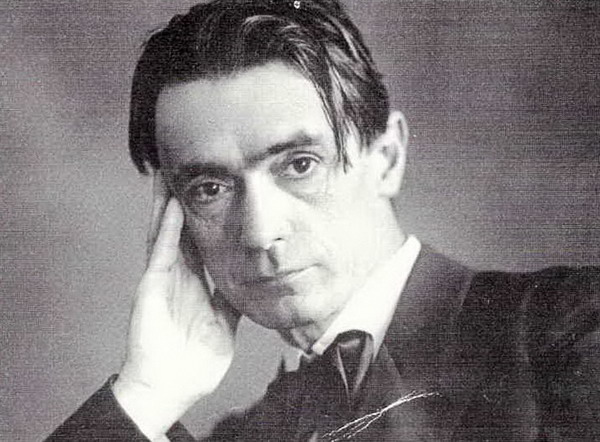Hero #124: Rudolph Steiner … (01/30/16)
Rudolf Joseph Steiner was an Austrian philosopher, social reformer, architect and esotericist. Steiner gained initial recognition at the end of the nineteenth century as a literary critic, and yet became truly prominent at the beginning of the twentieth century when he founded the anthroposophic spiritual movement – one that had roots in German idealist philosophy, theosophy, Goethean science, and Rosicrucianism. In the first phase of this movement Steiner attempted to find a synthesis between science and spirituality, applying the clarity of thinking characteristic of Western philosophy to profound spiritual questions. In a second phase, commencing around 1907, he began working in a variety of artistic media, including drama, the movement arts (developing a new artistic form, eurythmy) and architecture, culminating in the building of the Goetheanum, a cultural centre designed to house all the arts. In the third and final phase of his work, beginning sometime after World War I, Steiner established various practical-y applicable social reforms — including a new educational system (his Waldorf schools), a new system of organic agriculture (biodynamic farming), and a new system of healthcare (anthroposophic medicine).
The National Socialist German Workers Party gained strength in Germany after the First World War. In 1919, a political theorist of this movement, Dietrich Eckart, attacked Steiner and suggested that he was a Jew. Then in 1921, Adolf Hitler himself attacked Steiner on many fronts, including accusations that he was a tool of the Jews. Undeterred, that same year, Steiner rightfully warned against the disastrous effects it would have for Central Europe if the National Socialists came to power. Unable to guarantee his safety, Steiner’s agents cancelled his 1922 lecture tour, and Hitler’s failed coup attempt of 1923 inspired Steiner to give up his residence in Berlin, saying that if those responsible for the attempted coup came to power in Germany, it would no longer be possible for him to remain in the country.
In Steiner’s chief book on social reform, Toward Social Renewal, he suggested that the cultural, political and economic spheres of society need to work together as consciously cooperating yet independent entities, each with a particular task: political institutions should establish political equality and protect human rights; cultural institutions should nurture the free and unhindered development of science, art, education and religion; and economic institutions should enable producers, distributors and consumers to cooperate to provide efficiently for all of society’s needs.
“A healthy social life is found only, when in the mirror of each Soul the whole community finds its reflection, and when in the whole community the virtue of each is living … Love extends beyond the bounds of family to all human beings and is changed into vivifying, creative, transmuting power … So may my Soul bloom in Love for all existence … For it is so that God, having vanished from the world, is reborn in the depths of the human Heart.” ~ via Rudolph Steiner





 ;
;